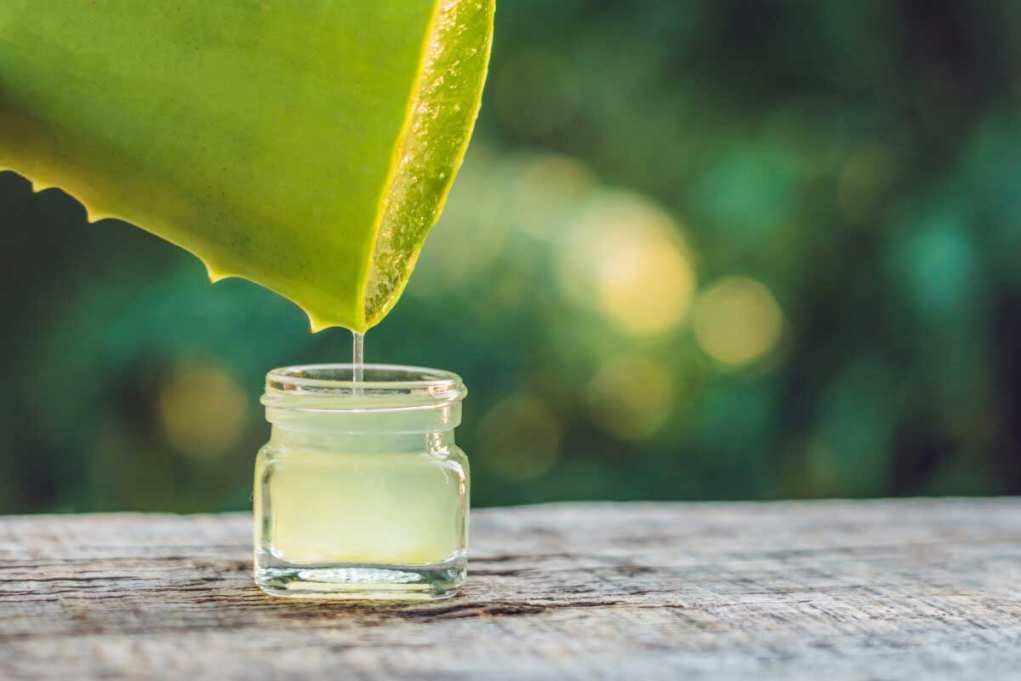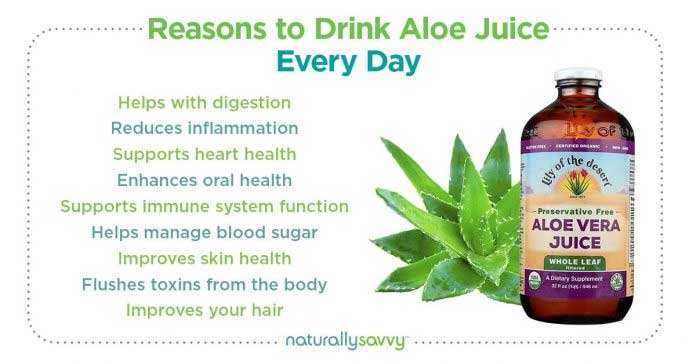
I’m going to let you in on a few secrets.
One, there are many reasons you may want to drink aloe vera juice every day. Although not every one of them may interest you, chances are many of them will, and that someone close to you may benefit from them as well.
Two, aloe vera juice can be very palatable, depending on how you take it. Although the juice can be a little bitter, mixing it with another liquid, such as coconut water, lemonade, or fruit/vegetable juices, can solve that issue tastefully.
Why Drink Aloe Vera Juice?
Basically, aloe vera juice contains about 75 active ingredients, including a wide range of vitamins, minerals, enzymes, amino acids, lignins, saponins, and sugar. Much of the research on the health benefits of aloe vera juice is positive, yet there are some cautionary notes as well. Those are mentioned in the list presented here.
Below are 9 reasons to include aloe vera juice in your diet on a daily basis, or at least several times a week.
It helps manage digestive challenges. The laxative properties of aloe vera juice benefit the digestive process. Aloe vera juice can soothe stomach ulcers, help regulate bowel movements, and encourage gut bacteria. It also has been shown to be helpful for the treatment of irritable bowel syndrome, as it can reduce abdominal pain and flatulence. The juice also can be used for ulcerative colitis.
Reduces inflammation. Aloe vera contains a hormone called gibberellin, which has been shown to reduce inflammation in people with diabetes. If you are living with osteoarthritis, then aloe vera juice could bring relief.
Supports heart health. Results of several studies have indicated that aloe vera juice can support various factors associated with heart disease and heart health. For example, 5,000 patients with long-term chest or heart pain experienced a reduction in pain and lower cholesterol levels after taking aloe vera juice. Diabetic patients in this group also showed a reduction in blood glucose levels. In a rabbit study, the administration of aloe vera appeared to reduce the risk of atherosclerosis.
Flushes toxins from the body. Aloe vera juice contains potassium, which stimulates the kidneys and liver (two organs involved in detoxification) as well as uronic acid, which helps remove toxins from cells. A small amount of aloe vera juice can help flush toxins from the digestive system.
Supports immune system function. According to a Polish study, taking aloe vera could support and promote your humoral (associated with bodily fluids) and cellular immunity. You may want to take a shot of aloe vera juice as a nightcap. That will allow it to travel throughout your body and enhance your immune function while you sleep, which is a time of rejuvenation.

It helps manage blood sugar. Aloe vera juice contains substances that are known to improve the effectiveness of insulin, including chromium, magnesium, manganese, and zinc. Although more research is needed, some suggest aloe vera juice can improve blood sugar levels.
It improves skin health. Aloe vera is perhaps best known for its ability to soothe skin irritation, treat burns, and help heal wounds. You also can use aloe vera juice to moisturize your skin. A thin layer of aloe vera juice dabbed on your skin can moisture your skin, improve facial wrinkles, heal acne, and treat scars.
Enhances oral health. The mouth is a breeding ground for many bacteria, and aloe vera can help eliminate the disease-causing microorganisms. Some research also has suggested aloe vera juice can serve as an efficient mouthwash because it can significantly reduce gingivitis and plaque.
It improves hair health. Aloe vera juice contains enzymes and anti-inflammatory properties that moisturize the scalp and soothes itchy dry scalp and hair. Because aloe vera juice is alkaline, it can balance the pH of your hair. Troubled by dandruff? Research suggests aloe vera can treat this annoying hair problem.
Using Aloe Vera Juice
For general use, 2 ounces (4 tablespoons) is suggested. However, you should check with your healthcare provider to determine the most appropriate dose for your needs.
Republished from NaturallySavvy.com
References:
- Agarwal OP. Prevention of atheromatous heart disease. Angiology 1985 36(8)
- Balan BJ et al. Oral administration of aloe vera gel, anti-microbial and anti-inflammatory herbal remedy, stimulates cell-mediated immunity and antibody production in a mouse model. Central European Journal of Immunology 2014; 39(2): 125-30
- Cho S et al. Dietary aloe vera supplementation improves facial wrinkles and elasticity and it increases the type I procollagen gene expression in human skin in vivo. Annals of Dermatology 2009 Feb; 21(1): 6-11
- Cowan D et al. Oral aloe vera as a treatment for osteoarthritis: a summary. British Journal of Community Nursing 2010 Jun; 15(6): 280-82
- Dana N et al. The effect of aloe vera leaf gel on fatty streak formation in hypercholesterolemic rabbits. Journal of Research in Medical Sciences 2012 May; 17(5): 439-42
- Davis RH, Maro NP. Aloe vera and gibberellin. Anti-inflammatory activity in diabetes. Journal of the American Podiatry Medical Association 1989 Jan; 79(1): 24-26
- Diabetes.co. UK. Aloe vera and diabetes.
- Guan Y-S, He Q. Plants consumption and liver health. Evidence Based Complementary and Alternative Medicine 2015; 2015: 824185
- Hashemi SA et al. The review on properties of aloe vera in healing of cutaneous wounds. Biomedical Research International 2015; 2015: 714216
- Karim B et al. Effect of aloe vera mouthwash on periodontal health: triple blind randomized control trial. Oral Health and Dental Management 2014 Mar; 13(1): 14-19
- Khedmat H et al. Aloe vera in treatment of refractory irritable bowel syndrome: trial on Iranian patients. Journal of Research in Medical Sciences 2013 Aug; 18(8): 732
- Sujatha G et al. Aloe vera in dentistry. Journal of Clinical Diagnostic Research 2014 Oct; 8(10): Z101-2
Important Notice: This article was published at www.theepochtimes.com by Andrea Donsky where all credits are due.
Disclaimer
The watching, interacting, and participation of any kind with anything on this page does not constitute or initiate a doctor-patient relationship with Dr. Farrah™. None of the statements here have been evaluated by the Food and Drug Administration (FDA). The products of Dr. Farrah™ are not intended to diagnose, treat, cure, or prevent any disease. The information being provided should only be considered for education and entertainment purposes only. If you feel that anything you see or hear may be of value to you on this page or on any other medium of any kind associated with, showing, or quoting anything relating to Dr. Farrah™ in any way at any time, you are encouraged to and agree to consult with a licensed healthcare professional in your area to discuss it. If you feel that you’re having a healthcare emergency, seek medical attention immediately. The views expressed here are simply either the views and opinions of Dr. Farrah™ or others appearing and are protected under the first amendment.
Dr. Farrah™ is a highly experienced Licensed Medical Doctor certified in evidence-based clinical nutrition, not some enthusiast, formulator, or medium promoting the wild and unrestrained use of nutrition products for health issues without clinical experience and scientific evidence of therapeutic benefit. Dr. Farrah™ has personally and keenly studied everything she recommends, and more importantly, she’s closely observed the reactions and results in a clinical setting countless times over the course of her career involving the treatment of over 150,000 patients.
Dr. Farrah™ promotes evidence-based natural approaches to health, which means integrating her individual scientific and clinical expertise with the best available external clinical evidence from systematic research. By individual clinical expertise, I refer to the proficiency and judgment that individual clinicians acquire through clinical experience and clinical practice.
Dr. Farrah™ does not make any representation or warranties with respect to the accuracy, applicability, fitness, or completeness of any multimedia content provided. Dr. Farrah™ does not warrant the performance, effectiveness, or applicability of any sites listed, linked, or referenced to, in, or by any multimedia content.
To be clear, the multimedia content is not intended to be a substitute for professional medical advice, diagnosis, or treatment. Always seek the advice of your physician or other qualified health providers with any questions you may have regarding a medical condition. Never disregard professional medical advice or delay in seeking it because of something you have read or seen in any website, video, image, or media of any kind. Dr. Farrah™ hereby disclaims any and all liability to any party for any direct, indirect, implied, punitive, special, incidental, or other consequential damages arising directly or indirectly from any use of the content, which is provided as is, and without warranties.








